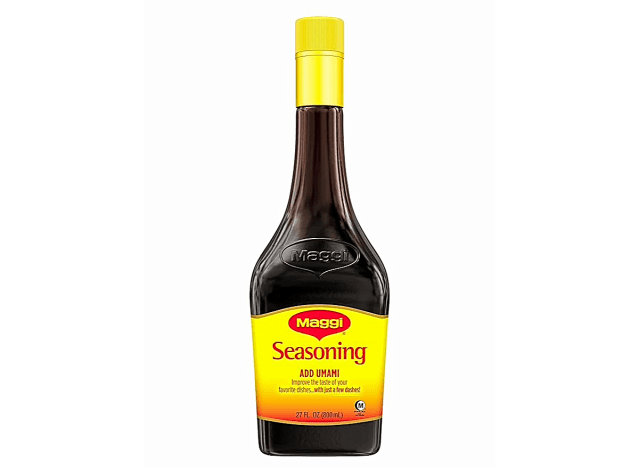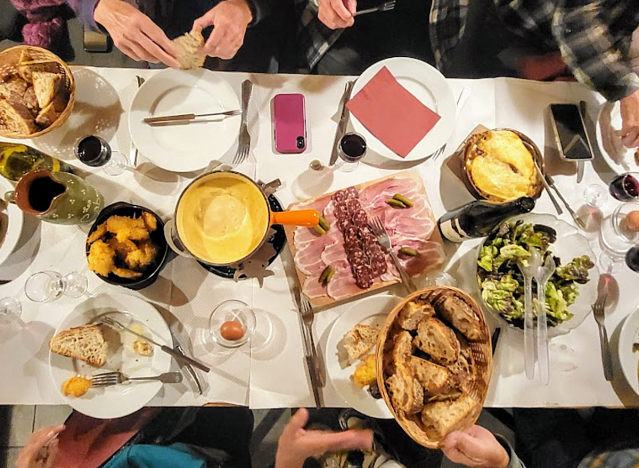This All-Purpose Seasoning Has Changed the Way I Cook Every Meal

France is probably not where you'd think a packaged, processed secret ingredient would reveal itself, but that's just where I discovered Maggi, and cooking may never be the same.
You may have seen this stuff and not noticed it. The packaging isn't particularly enticing, so if you don't know what it is or what to do with the small bottle of brown liquid with the yellow label, you'd likely walk right by it. But if you know? Then you really know. (There's even a vintage metal sign advertising Maggi at my favorite restaurant in Paris.)

I first learned about Maggi while devouring a classic green salad at a restaurant tucked away high in the French Alps. A simple French vinaigrette is already perfection but there was something different about this one. Something … extra. Some layer of flavor that made this exponentially better than normal, and it wasn't just my roaring appetite from a day of hiking.
I asked the server, and she told me very matter-of-fact that the dressing contained a few dashes of Maggi. This decidedly unglamorous, all-purpose seasoning got its start in neighboring Switzerland in the late 1800s and is now owned by conglomerate Nestle. You can buy it online and may even find it at your local grocery store.

When I came home from that trip and promptly tried to recreate that Alpine feast, Maggi went into the salad dressing and everyone was suitably wowed.

Admitting you like this product may raise some eyebrows in certain circles. No joke: the first expert I talked to for this story declined to let me use his name, since he comes from the world of fine dining, where all things local, natural, and otherwise high quality reign supreme.
The main reason for his secrecy is found right on the label: Monosodium glutamate (MSG), a popular but controversial flavor enhancer, is the third listed ingredient after water and salt, according to the manufacturer's website. (Some bottles in the U.S. may instead list common MSG replacements like disodium guanylate and disodium inosinate.) A bottle of stuff swimming with MSG simply isn't a good look for someone in his line of work. Eric, as I'll call him, has a background in cultural anthropology, agriculture, cooking, and food activism, and has studied and lived in France. And Eric happily cooks with Maggi, just not on the record.
First, let's deal with the MSG question. "You can do your own research," Eric says. "Some people will say it's really bad and other people will say it's not but there's no denying that it is delicious, and appears in all kinds of food whether hidden or overt." (Spoiler: thinking you're "sensitive" to MSG is likely no more than societally ingrained bias, according to the Cleveland Clinic. MSG also occurs naturally in many foods so you won't even see it on the label.)
"My earliest interaction with Maggi was with my [Swiss] grandmother who made a fantastic salad," Eric says. "As I got older and wanted that recipe, she's like, 'here it is,' and I'm like, 'what's this stuff?' she's like, 'Oh, it's seasoning that we use in Switzerland.'"
Eric uses Maggi now in everything from hamburgers and salad dressing to the pork marinade from Andy Ricker's popular 2013 cookbook "Pok Pok." He explained that this magic potion acts as a shortcut to unlocking flavors similar to what you would get in the Maillard reaction, the browning process in delicious things like meat that brings out delectable umami.
Not all food folks feel the need to hide their Maggi, though. James Beard Award-nominated chef Alison Settle (who is also a friend and fellow culinary-tour leader) is totally fine being loud and proud when it comes to the stuff. "I'm not going to take any shortcuts with my food," she says. "I'm prepping everything pretty much from scratch. But there are some little tools in my toolbox that are going to take this from one level to another that's even better. I don't see that it's particularly salacious."
Alison learned about Maggi while living and working in Germany, and has worked the seasoning into her repertoire since. What's fair game? "Anything that you want to dial up the savory and umami aspects," she says, "so any kind of pastas, salad dressings"—and certainly in her French onion soup or Taiwanese beef noodle soup.
I, for one, still have my Maggi stashed in the fridge and am excited all over again to start adding it to, well, just about everything.









